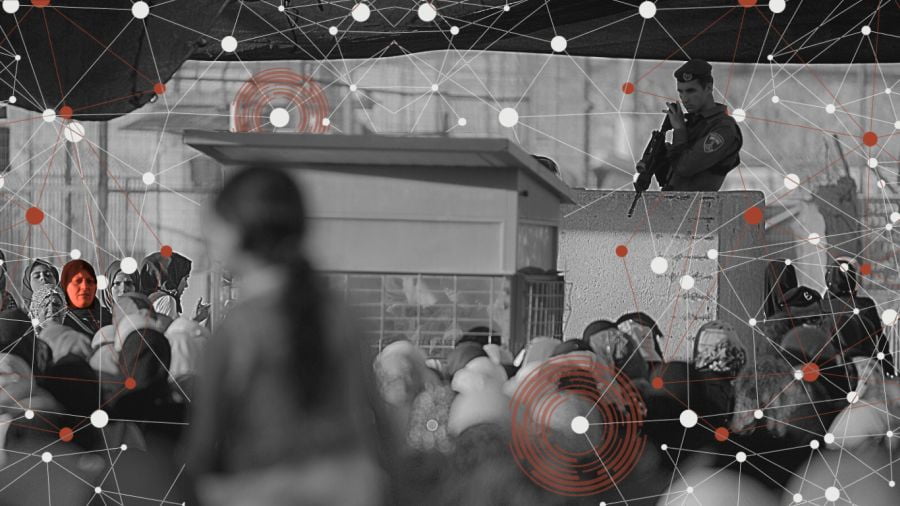Israeli Occupation: How Microsoft, IBM, Cisco and Dell Enable Surveillance and Control in Palestine
In September, Israel installed an AI-powered gun at a military checkpoint in the occupied West Bank city of Hebron. Now, that same technology has been deployed at the entrance of the Aida refugee camp in Bethlehem. Across occupied East Jerusalem, you can find surveillance cameras strategically placed on street corners. And throughout the West Bank, Palestinians’ encounters with Israeli soldiers often include not only violence but face-scanning apps designed to capture their personal data.
Technology has become integral to our modern lives, but for Palestinians, Big Tech has also become another way Israel enacts control.
Who Profits, an Israeli research center documenting the private sector’s links to Israeli occupation, released a report in May on multinational tech companies’ role in facilitating Israel’s human rights violations. The impact of each company ranges, with some overseeing a major project while others provide equipment to a system already in place.
Who Profits wrote in its analysis:
Regardless of scale, the work of these companies bolsters the capacity of an already highly technological and data-oriented Israeli occupation economy and its capacity to dispossess, repress, control and subject Palestinians on both sides of the Green Line to pervasive surveillance.”
While countless Israeli and international companies are involved in the Israeli occupation, Who Profits highlighted four American tech corporations in its report: Microsoft, IBM, Cisco Systems, and Dell Technologies.
Big Tech’s role
According to Who Profits, multinational tech firm Microsoft – one of the world’s largest IT companies – has a long history of collaboration with the Israeli military and tech industry.
The “Al Munaseq” (the coordinator in Arabic) application runs on Microsoft Azure, the company’s platform for cloud computing services. It was developed by Israel’s Ministry of Defense and is used to manage permits for Palestinians in the occupied West Bank and Gaza when entering 1948-occupied Palestine or modern-day Israel. The app can access a permit holder’s phone’s IP address, camera, files, and location.
Microsoft has immersed itself in the Israeli military’s ties to the education sector. The company currently offers AI courses for officers in the “military fighting methods and innovation” unit. It also recently launched free cybersecurity training courses for veterans and is partnering with the military on a program helping female high school students enter high-tech units in the military.
The company’s main business alliance is with the Israeli military, yet it also provides services to the settlements and government. Its applications are used by students and teachers in Ma’ale Adumim settlement schools. Microsoft also works with Ariel University, the only Israeli college located in a settlement, to provide free use of its applications and email services. Ariel University is also a recognized college of Microsoft, offering a Microsoft Certified Solutions Associate course to students.
Microsoft Israel, the corporation’s local subsidiary, is currently contracted with the Israel Police to provide cloud services for six months from January and to provide licensing for Microsoft products until December 2025.
This year, after much delay, Microsoft plans to open its first cloud data center in the Modi’in Technology Park, located between Tel Aviv and Jerusalem. The corporation is estimated to spend $1-1.5 billion on the data center.
IT and computer firm IBM works with Israel’s Population, Immigration, and Borders Authority to operate the Eitan System for the government’s Population Registry database. This computer system stores the personal information of Palestinian and Syrian people living under Israeli occupation. The data stored is often used to implement Israel’s discriminatory policies.
IBM’s Israeli subsidiaries — Red Hat Israel and IBM Israel — collaborate extensively with the IDF. Red Hat provides edge computing and software-based storage data centers to several Israeli military units and is involved in joint projects in the Computer Service and Cyber Defense divisions. In 2020, IBM Israel became the main IT provider for three new military regional logistics centers.
The American multinational works with the military and Education Ministry to boost high schoolers’ interests in technology, with the goal of improving Israel’s defense and hi-tech capabilities. Often this means its staff lecture at schools alongside military officers. The company has also participated in events at Ariel University.
IBM has also partnered with the Israel Police, providing computer and software equipment since 1975. More recently, in 2018, the company set up a cyber research center in Be’er Sheva, a city in the Naqab desert, next to a military telecommunication base and Computer Service Directorate campus. The center and its location are part of the Defense Ministry’s plan to transition Cyber Unit officers into the high-tech industry after they finish their service.
Tech giant Cisco Systems has also launched tech hubs in the Naqab, with two located in the Palestinian Bedouin towns of Hura and Ar’arat al-Naqab. These hubs, along with IBM’s cyber center, are part of Israel’s efforts to settle the Naqab with Jewish Israelis while pushing out the native Bedouin community. As part of plans to Judaize the area, the Israeli military built its biggest information and communication technology underground data center in the desert, complete with Cisco Systems’ computing, communication, cybersecurity, and load-balancing systems in place.
Additionally, Cisco Systems has opened three other tech hubs on occupied land in the Syrian Golan Heights and West Bank and plans to open another five in these occupied territories.
This year, electronics giant Dell Technologies won a more than $150 million tender from the Defense Ministry to provide the military with servers, maintenance services, and other equipment. In 2021, Dell’s Israeli subsidiary, VMware Israel, secured a contract to supply the Israeli Police with its products from August 2021 to January 2027.
VMware’s virtual services help run the Israel Police’s system of surveillance in East Jerusalem, known as the Mabat System. Around 400 security cameras have been installed across Jerusalem’s Old City, with the video surveillance monitored 24/7 by a police command and control center.
Labeled the “startup nation,” Israel’s technological advancements have attracted tech companies across the world. But as Big Tech becomes more and more involved with Israel’s military and tech industries, the more they actively collaborate with apartheid and the more Palestinians and Syrians under occupation are digitally exploited.
Feature photo | Illustration by MintPress News







